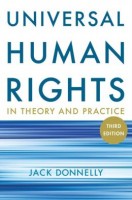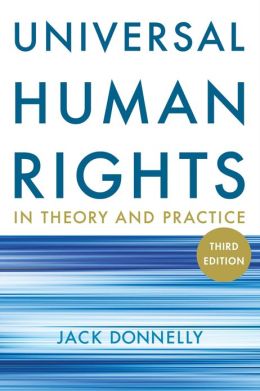 Author: Jack Donnelly
Author: Jack Donnelly
Publisher: Cornell University Press – 320 pages
Book Review by: Paiso Jamakar
The subject of human rights is complex, controversial, and detailed to say the least, but author Jack Donnelly provides a clear and concise framework within which it can be looked at and easily understood.
In this book, he provides support to the strongly-held belief that human rights are inalienable, meaning that these rights as a whole or any one of them in particular, cannot be taken away by any government, be it autocratic or even democratic. We include ‘democratic’ because history has shown that leaders of ‘democratic’ countries have defined democracy in ways that suit them personally, but not to at least a majority of the governed people.
Donnelly asserts that human rights are universal rights. In other words, human beings have certain rights that are universal or rightful and necessary, regardless of where they live, or which political entities they are a part of.
Why is it important that we have a very clear conception of human rights? It is because such clarity is our weapon of defense against people in authority – legitimate or otherwise – who would usurp them and take advantage of us.
Right now for example, in the United States, the National Security Agency is able to, and has begun, or has already been doing so for some unknown time, keeping tabs of all daily records of telephone conversations, emails and Internet searches of everyone in this country. This amounts to billions of records each day. But the debate has not even begun on whether such government surveillance constitutes an invasion of privacy.
I am of the opinion that such actions are an invasion of privacy, even as some members of government try to justify them as means to prevent or catch terrorists from doing harm. There are certainly other ways of preventing terrorism as has been demonstrated in the past, and we invoke the defense that “the end does not justify the means.”
People in the U.S. do have a right to privacy as provided in the Constitution, but the snooping by the government began secretly without the knowledge of almost all the people, except a handful few individuals in the executive, legislative, and judicial branches of government. If people do not question such a violation of their right to privacy, what will the U.S. government do next, secretly? We believe in Machiavelli’s saying: “Power corrupts, and absolute power corrupts absolutely.”
There are 96 topics covered in this book in its 16 chapters organized around five sections. The variety of topics range from the concept of human rights to the universality of human rights to the history of rights to how rights work, and to the various types of rights such as anti-genocide, economic, freedom, human dignity, humanitarian, individual, non-discrimination, political, religious, sexual, social, and survival rights, to name some of them.
In this book, you’ll also read about topics such as cultural rights, the definition of democracy, dignity and its evolution as a human right, equal concern and mutual respect, human rights in relation to foreign policy, and many other concerns, questions and issues you may be having in your mind.
As we mentioned earlier, the subject of universal human rights (as with others’ rights or social rights) is complex, so the large number of topics surrounding it is of no surprise to me. To give you a broad overview of the coverage however, these are the titles of the four parts of this book:
- Part I. Toward a Theory of Human Rights
- The Universality and Relativity of Human Rights
- Human Rights and Human Dignity
- Human Rights and International Action
- Contemporary Issues
This book not only provides a lot of information on universal human rights but also provides a large number of references to other books and materials on this subject. The list of such reference works is 23 pages long. Yes, we’re really not kidding when we say that this subject is detailed and complex.
Jack Donnelly is Andrew Mellon Professor and John Evans Professor at the Josef Korbel School of International Studies at the University of Denver. His other books include International Human Rights and Realism in International Relations.







